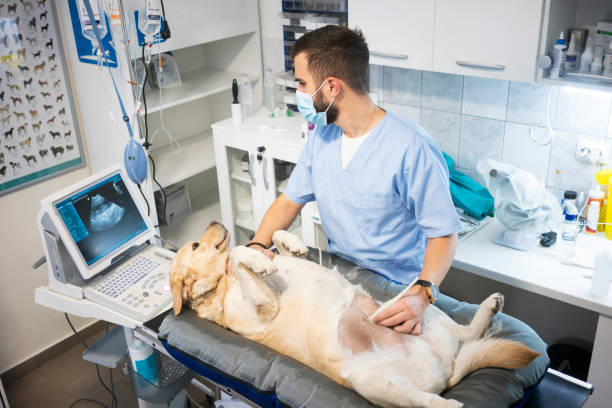
Congratulations! If you think your dog may be pregnant, you are probably feeling a mixture of excitement and anticipation. However, before you start planning for the arrival of your new puppies, it is important to confirm that your dog is actually pregnant.
In this blog post, we will discuss the signs of pregnancy in dogs, as well as how to confirm pregnancy with a veterinarian. We will also provide some tips for caring for a pregnant dog.
Signs of Pregnancy in Dogs
There are a few signs that can indicate that your dog is pregnant. These include:
- Weight Gain: One of the most obvious signs of pregnancy is weight gain. Your dog’s belly will start to enlarge as the puppies grow.
- Behavioral Changes: Your dog’s behavior may also change during pregnancy. She may become more clingy or affectionate, or she may start to exhibit nesting behavior.
- Veterinary Exam: The best way to confirm pregnancy is to take your dog to the veterinarian for an exam. The veterinarian will be able to palpate your dog’s abdomen to feel for the puppies and may also perform an ultrasound.

Other Signs of Pregnancy in Dogs
In addition to the signs mentioned above, your dog may also experience some of the following symptoms during pregnancy:
- Increased Appetite: Your dog’s appetite may increase during pregnancy.
- Nausea and Vomiting: Some dogs may experience nausea and vomiting during pregnancy, especially in the early stages.
- Swollen Nipples: Your dog’s nipples may become swollen and darker in color during pregnancy.
- Milk Production: In the later stages of pregnancy, your dog may start to produce milk.
How to Confirm Pregnancy with a Veterinarian
The best way to confirm pregnancy in dogs is to take your dog to the veterinarian for an exam. The veterinarian will be able to palpate your dog’s abdomen to feel for the puppies and may also perform an ultrasound.
Ultrasound: An ultrasound is a safe and non-invasive way to confirm pregnancy in dogs. The veterinarian will use a transducer to send sound waves into your dog’s abdomen and create an image of the puppies.
X-ray: An x-ray can also be used to confirm pregnancy in dogs, but it is not as accurate as an ultrasound. The x-ray will show the skeletons of the puppies, but it is not possible to see the puppies’ organs or movements.
Blood Test: A blood test can also be used to confirm pregnancy in dogs, but it is not as accurate as an ultrasound or x-ray. The blood test will measure the levels of certain hormones that are produced during pregnancy.
Caring for a Pregnant Dog
If you have confirmed that your dog is pregnant, it is important to start caring for her properly. Here are some tips for caring for a pregnant dog:
- Feed your dog a high-quality food that is specifically designed for pregnant dogs. This will help to ensure that she is getting the nutrients she needs to support her pregnancy and the development of her puppies.
- Increase your dog’s water intake. She will need to drink more water to stay hydrated, especially as her pregnancy progresses.
- Take your dog for regular walks, but avoid strenuous exercise. Exercise is important for pregnant dogs, but it is important to avoid strenuous exercise that could put her at risk.
- Monitor your dog’s weight gain and make sure she does not gain too much weight. Overweight dogs are more likely to have complications during pregnancy.
- Schedule a whelping appointment with your veterinarian. Your veterinarian will be able to help you prepare for the birth of your puppies and provide you with aftercare instructions.
With proper care, your pregnant dog should have a healthy and uneventful pregnancy.
If you think your dog may be pregnant, it is important to take her to the veterinarian for an exam. The veterinarian will be able to confirm pregnancy and provide you with information about caring for a pregnant dog. With proper care, your pregnant dog should have a healthy and uneventful pregnancy.
Frequently Asked Questions
Q: How can I tell if my dog is pregnant early on?
A: There are a few signs that can indicate that your dog is pregnant early on. These include:
- Weight Gain: Your dog’s belly may start to enlarge, but this can be difficult to see in the early stages of pregnancy.
- Increased Appetite: Your dog’s appetite may increase.
- Nausea and Vomiting: Some dogs may experience nausea and vomiting during pregnancy, especially in the early stages.
- Swollen Nipples: Your dog’s nipples may become swollen and darker in color.
However, it is important to note that these signs can also be caused by other conditions, such as a false pregnancy. The only way to confirm pregnancy is to take your dog to the veterinarian for an exam.
Q: How long is a dog’s pregnancy?
A: The average dog pregnancy is 63 days, but it can range from 58 to 68 days.
Q: What should I do if I think my dog is pregnant?
A: If you think your dog is pregnant, it is important to take her to the veterinarian for an exam. The veterinarian will be able to confirm pregnancy and provide you with information about caring for a pregnant dog.
Q: What should I feed my pregnant dog?
A: It is important to feed your pregnant dog a high-quality food that is specifically designed for pregnant dogs. This will help to ensure that she is getting the nutrients she needs to support her pregnancy and the development of her puppies.
Q: How much exercise should my pregnant dog get?
A: Exercise is important for pregnant dogs, but it is important to avoid strenuous exercise that could put her at risk. Stick to short walks and avoid running or jumping.
Q: When should I take my pregnant dog to the vet?
A: You should take your pregnant dog to the vet for an initial exam at around 30 days of pregnancy. The veterinarian will be able to confirm pregnancy and discuss your dog’s care plan. You should also take your dog to the vet for a whelping appointment at around 60 days of pregnancy.
I hope this FAQ section helps! Let me know if you have any other questions.